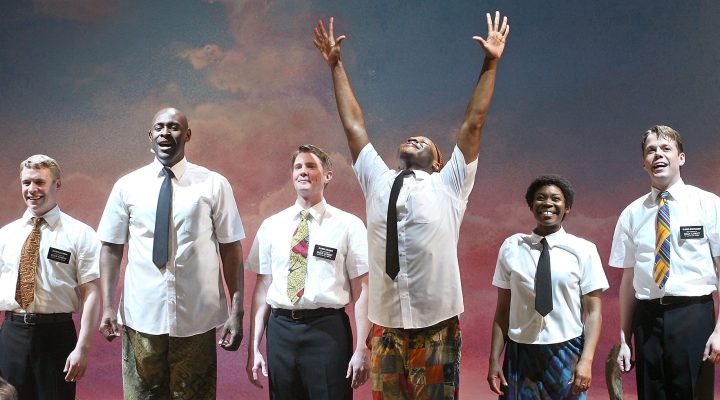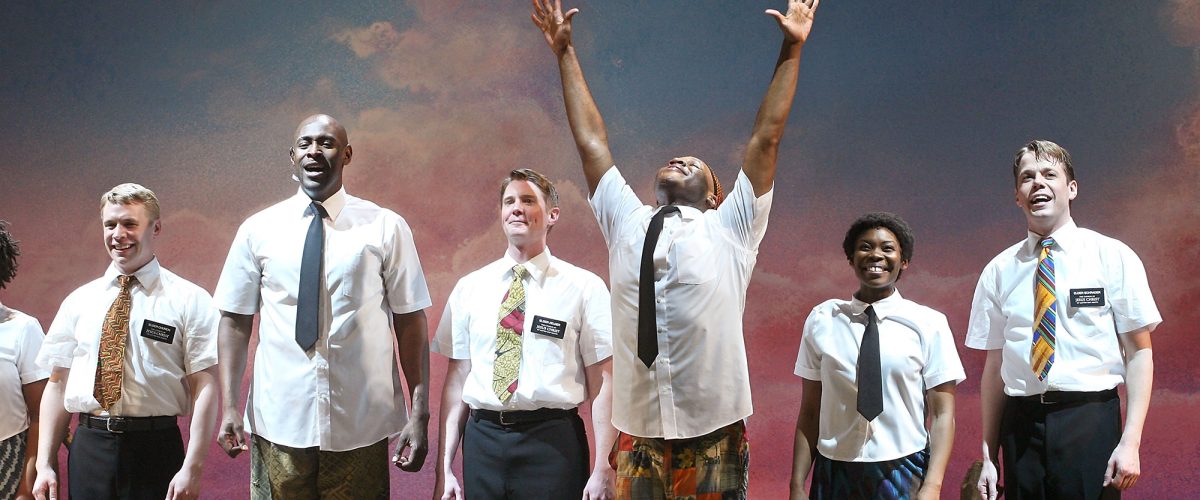I’ve seen the hit Broadway musical The Book of Mormon twice. Deliciously blasphemous, it is as profound as it is profane. It’s also brutally honest and theologically instructive.
Written by the creators of South Park (Matt Parker and Trey Stone), the musical is brutally honest about the founder of Mormonism, Joseph Smith, using parody and song to convey what a grifter and charlatan he actually was, which squares with the historical record.
In 1826 a court in Bainbridge, N.Y., convicted Smith of being a “disorderly person and imposter.” At his trial he confessed to defrauding citizens by leading gold-digging expeditions. He also claimed to possess dark, magical powers. Four years later he announced he had been visited by an angel, Moroni, who revealed a book (The Book of Mormon) written on gold plates which alleged Jesus’ ministry in North America.

David Ramsey
The musical mocks this story, rightfully and brutally. Neither Smith nor his religion deserve anything less than contempt and ridicule, given the historical record and obviously fanciful tale.
The musical The Book of Mormon is also, theologically, brutally honest. The backdrop for the musical is a remote village in Uganda where most of the villagers have AIDS, and two young Mormon missionaries have been sent to proselytize this primitive people. The missionaries learn a popular song of the Ugandans:
In this part of Africa, we all have a saying — whenever something bad happens, we just throw our hands up to the sky and say, “Hasa Diga Eebowai!”
It’s the only way to get through all these troubled times. There’s war, poverty, famine … but having a saying makes it all seem better
We’ve had no rain in several days!
“Hasa Diga Eebowai!”
“And 80% of us have AIDS!”
When the world is getting you down, there’s nobody else to blame!
Raise your middle finger to the sky, and curse his rotten name!
 The song suggests the Ugandans believe in God and implies they hold God responsible for their miserable lot in life. They express their anger through “Hasa Diga Eebowai,” which translates to something not printable here. This is either the high or low point in the musical, depending on your religious sensibilities. In both performances I’ve seen, a smattering of attendees walk out after this song.
The song suggests the Ugandans believe in God and implies they hold God responsible for their miserable lot in life. They express their anger through “Hasa Diga Eebowai,” which translates to something not printable here. This is either the high or low point in the musical, depending on your religious sensibilities. In both performances I’ve seen, a smattering of attendees walk out after this song.
Profoundly profane, this song isn’t that far from the sentiment of the writers of the Wisdom tradition of the Old Testament who began pushing back against the conventional religious belief of that time, which biblical scholars call “Deuteronomistic theology.” This worldview assumed that God is responsible for everything that happens in life, both the good and the bad (yes, the bad). In this worldview, goodness and evil are rewarded and punished in this lifetime and, upon death, everyone goes to the same nebulous place or state of being, Sheol.
In a dissenting voice, Qoheleth argues that “time and chance happen to us all” (Ecclesiastes 9:11). In short, stuff happens to all of us, regardless of our piety or righteousness.
Another book from the Wisdom tradition, the Book of Job, is about a man whose life and family God destroys, all over a bet with the Satan ( a member of the divine council in the mythology of that day, which name translates “prosecutor” in Hebrew). In what some scholars believe is an appendage to the original manuscript, in an attempt to preserve the divine scales of the Deuteronomistic theology, God eventually gives Job back animals and children — new ones, because the old ones are still dead.
In a new translation of the book of Job, Job: A New Translation by Edward Greenstein, the famously repentant hero gives God a piece of his mind. The Hebrew phrase commonly rendered as some form of “I repent,” Greenstein translates as “I take pity on.” (Job 42:6). “Dust and ashes,” meanwhile, is for Greenstein a biblical epithet meaning humanity in general. So the line becomes, “I take pity on ‘dust and ashes.’” He further translates: “And then Job said unto the Lord, what a world you’ve made, God. I feel sorry for everyone.”
In a review of Greenstein’s book, James Parker writes: “This newly revealed Job is expressing defiance, not capitulation. … Here is a middle-finger Job, a Job unreconciled to the despotism of experience. He’s been shattered by life-shocks; then God, like a wall of terrible noise, fills and overfills his mind. Job’s response: Thank you, but no.”
“There is more intellectual honesty and courage in the Ugandans’ hymn, and Greenstien’s Job, than most any prayer ever uttered in a temple or sanctuary.”
I submit that there is more intellectual honesty and courage in the Ugandans’ hymn, and Greenstien’s Job, than most any prayer ever uttered in a temple or sanctuary. There is an intellectual dishonesty in prayers and religious services that only focus on the good things in life (the blessings) and attribute those to God while ignoring the bad and letting God off the theological hook for an often-calamitous creation. If there is a God, and she can’t handle our raw unfiltered honesty in the face of tragedy, that isn’t much of a God, certainly not one worthy of worship.
The closest I came to such honesty in a religious service was in a very unusual funeral I was asked to officiate in the mid 1990s in Farmville, Va., for a member of a motorcycle gang who had died in a single-vehicle crash.
I arrived early at the funeral home and began seeing something I can only describe as out of a Hollywood movie set. More than 100 bikers, clad in black leather from head to toe, were pouring into the funeral home to pay their last respects to their deceased friend. Farmville, Va., is a small college town (Longwood University and Hampden-Sydney College), and I never had seen a single, solitary biker, let alone 100 dressed in biker attire, during my time there.
Curious, I wanted to see the man whom I was about to eulogize who had attracted such a crowd of fellow bikers. But I wasn’t prepared for what I saw as I peered into the casket his friends had made for him and draped with a Harley Davidson banner: The deceased biker was clutching a marijuana bong. The first thought that popped into my mind was, “Well, he’s certainly going out with a bong!” You can’t make this stuff up!
After a brief graveside service at the cemetery, and away from the crowd, a couple of the bikers raised their heads skyward and began yelling, “F*** you God! F*** you God!”
“I was struck by their brutally raw, honest and unfiltered cries to a God in whom they presumably believed given their theological invocation.”
I was struck by their brutally raw, honest and unfiltered cries to a God in whom they presumably believed given their theological invocation. And then I thought: What a perfect and fitting benediction. These bikers were grieving the loss of a friend, and, unbound by tradition or protocol, they shook their fists at a God whom they held responsible, rightly or wrongly, for their loss.
One of the men approached me, apologizing for their behavior. I told him no apology was necessary and that I was touched by such apparent love for a dear friend. I also told him I thought their cries to God actually were a prayer and that the God I believed in was big enough to handle their raw anguish and profane prayer. And any God who couldn’t handle such honesty and existential transparency, I suggested, was a small and insecure God.
It would be some 20 years later when I would hear the prayer of these bikers uttered again, but this time it was in a different setting, a theater in Durham, N.C., where I saw The Book of Mormon for the first time. As I listened to “Hasa Diga Eebowi,” I remembered the biker funeral and wondered what it would be like if those bikers saw The Book of Mormon and heard “Hasa Diga Eebowi.” I could almost hear them saying, “They stole our prayer! That Baptist preacher said that was a prayer. They’re making money off of our prayer!”
And in Jesus’ name, the bikers and the Ugandans prayed.
D.B. Ramsey is an author, columnist and former Baptist minister. He holds degrees from Wake Forest University and Duke University and was a fellow at Princeton Theological Seminary. His book’s website is dbramsey.com. He is currently a principal with the world’s largest on-line retail and cloud technology company and lives in Wolf Laurel, N.C.
Related articles:
Is Mormonism a cult? | Opinion by Jim Denison
Mormons and the 2020 presidential election: It’s complicated | Analysis by Mark Wingfield


